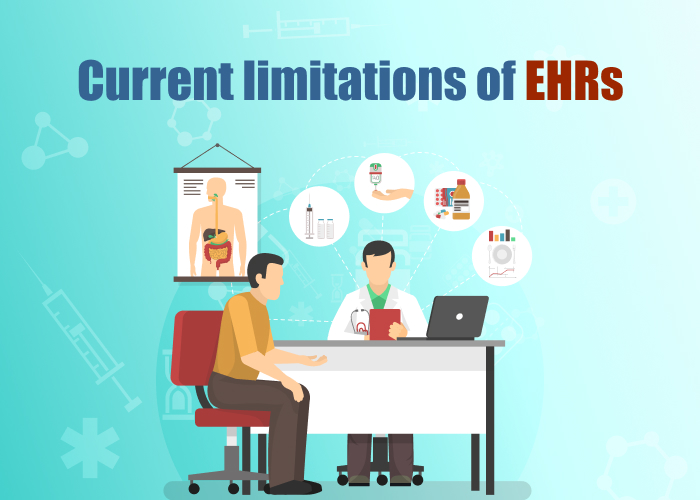Current limitations of EHRs

The healthcare business has to be mindful of the hazards that come with the rapid technological advancements that it is experiencing. Doctors still struggle to embrace EHRs in spite of all the apparent advantages. Let’s examine a few of the difficulties in implementing EHRs in healthcare facilities.
- Physician Burnout – Currently, burnout is the most common problem in the healthcare industry. EHR systems take a substantial amount of time to process new data. Thus, doctors don’t have enough time to practice patient communication. This leads to a decline in the standard of patient care as well as increased stress and a loss in work satisfaction for doctors.
- Interoperability – A lack of compatibility across different systems makes it difficult to adopt electronic health records. Effective system communication is essential to get a comprehensive picture of a patient’s medical history. When there is insufficient interoperability between various EHR systems or across parts of a comparable EHR, data communication in an EHR frequently gets delayed. There may be situations when doctors need to access labs quickly for a patient in the hospital or if records are located in a separate area of the hospital and are out of reach for them. Thus, for companies that develop healthcare apps, creating an interoperable framework continues to be a formidable challenge.
Innovations that improve Electronic Health Records
Increase in Usability
The biggest determinant of optimization will be the user interface of the EHR. How healthcare professionals utilize the tool on a daily basis has a big influence on patient safety, clinic operations, and burnout. Furthermore, an EHR-based reminder might be a useful replacement for obtrusive post-order warnings in order to reduce duplicate order input.
AI to enhance interoperability
EHRs have created a multitude of problems, including clogging up physician workflows, limiting interoperability, and generating a lot of data. However, EHR providers are making an effort to improve their offerings in light of the growing use of cutting-edge technologies like AI to improve medical diagnostics.
Virtual Assistants
Going from patient to patient can sometimes leave doctors with a great load of documentation. Providers have challenges when they have to search for documents at the end of the day. Adding virtual assistants to Electronic Health Records can help to deal with this issue.
Voice Recognition
Voice recognition technology allows doctors to enter patient data and information hands-free, which is a huge benefit for EHR systems. Narrating data in the EHR decreases inaccuracies and mistakes and expedites the process of capturing information. For example, utilizing voice technology, a doctor might query the EHR system for a patient’s last reported sugar levels from a blood test.
Predictive Analytics
Predictive analytics apps also have a big impact on the healthcare sector. In order to improve the patient experience and care delivery, several healthcare app development services employ AI-powered analytic techniques including statistics, data mining, and modeling in accordance with AI to give clinical outcome predictions based on real-time device data and EHR.
Mobile and Cloud
Since patient data accessibility is one of the main advantages of having Electronic Health Records system in place, as you may already be aware, it makes perfect sense that the data would get more sophisticated as the population grows.
This means that in order to store and retrieve data securely, cloud-based infrastructure and mobile computing are required. This will make it possible for medical personnel to use a tablet or smartphone to access the data, increasing their productivity in the clinical setting and offering mobility options that will ensure long-term success.
Conclusion
In conclusion, the integration of technology into Electronic Health Records (EHRs) has revolutionized healthcare, improving efficiency, accuracy, and patient care. While challenges persist, the ongoing collaboration between technology and healthcare professionals promises a future where EHRs continue to evolve, providing personalized, data-driven insights for better health outcomes.
FAQs
What are Electronic Health Records?
How has technology improved the accuracy of EHRs?
What are the security concerns associated with EHRs?
How do EHRs contribute to improved patient care?
What challenges does the healthcare industry face in adopting EHRs?
Ravi Bhojani is the Chief Marketing Officer (CMO) at Alian Software, where he spearheads the company’s marketing strategies and drives its brand presence in the competitive IT services landscape. With over a decade of experience in the technology and marketing sectors, Ravi has consistently demonstrated his ability to blend innovative marketing techniques with deep industry knowledge to deliver outstanding results.